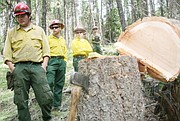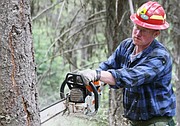DNRC training for fire season
Thanks to spring rain and cool days, it's been about one and a half months since the Department of Natural Resources (DNRC) in Plains has had to respond to a wildland fire.
Thanks to spring rain and cool days, it's been about one and a half months since the Department of Natural Resources (DNRC) in Plains has had to respond to a wildland fire.
Even though they've had the long break, they were hard at work on Thursday training for a fire season that is inching closer and closer to the area.
After spending the early morning in a classroom the fire crew ventured northwest of Plains just ahead of a logging crew to practice felling trees in the forest.
It was an important lesson for the crew, and one that would help them become "proficient and safe" in the technique says DNRC Fire Supervisor, Calvin Minemyer.
Firefighters will fell their fair share of trees during the fire season and the practice of a 50 foot tall ponderosa pine tree crashing to the earth can come with a high amount of risk.
"That's why we train, to minimize the danger factor," says Minemyer.
Senior Engine Boss, Doug Browning demonstrated proper technique. He, along with the other veteran crew members, voiced important risk factors such as incorrectly guessing the lean of a tree or the crashing tree snagging on other trees causing them to spring back at the firefighter.
After the demostration by Browning that showed him clearing away potential snags on the ground, creating a proper wedge while cutting the tree and him even cutting apart two small trees snagged together the rest of the fire crew paired up and practiced felling their own trees.
The Thursday lesson was not unique for the fire crew. Every Thursday throughout the spring and summer the crew gathers to hone their skills by conducting fire fighting training lessons and drills, sometimes alongside the Plains/Paradise Rural Fire Department, sometimes with the Lolo National Forest Service and sometimes just by themselves.
The training, which is broken up from Thursday to Thursday, has covered a multitude of different subjects including: map and compass training, pump and hose training and radio/gps training.
All of it goes a long way when the fire season hits the area, a prospect that once was greatly feared during a dry winter followed by a hot spring, but has eased back after a rainy June.
"I think if we get a fire season it could be a short one," says Stan Meredith, fire team leader. "I think we're still two weeks out." He went on to say that it will greatly depend on the timely rains they receive throughout the summer.
For now, even if mother nature postpones its yearly fire season, the crews will still be out there every Thursday practicing and conducting drills for however long of a fire season Western Montana receives.





